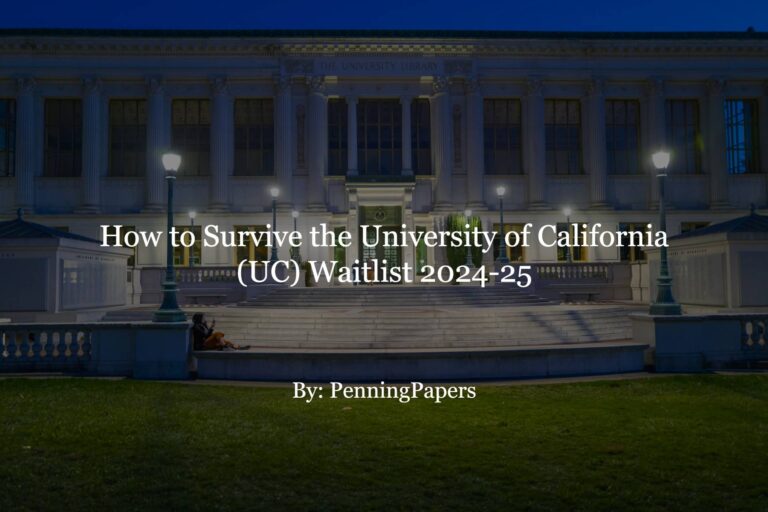Here’s the thing: among all admissions results, the UC waitlist is the most brutal for students.
Why?
Well, they get to fight the nail-biting fear that comes with “what if?” We all know what the “what if?” is.
It’s the drop in your stomach when you have to wait even longer in uncertainty. Your heart feels heavy —so, so heavy— with worry that you’re like a bee so full of honey it can’t fly. What was once sweet nectar of hope and expectancy has rotted into perpetual terror.
It’s the… uhh, well, you get the point.
So, enough with the poetic candor. Long story short, waitlisted students have it rough.
But, fear not! We’re here to help!
This article serves as a comprehensive guide to help waitlisted students like yourself get through this arduous process. We’ve split it into two sections: how to get through the torturous emotional parts, and what to do from a practical perspective.
Oh yeah: and, if you know anyone else suffering through the waitlist process, consider sharing our survival guide post with them!
The University of California Waitlist Survival Guide
- Letting Go of the Illusion of Control.
- How to ACTUALLY Overcome Jealousy.
- Optimizing Your College Options With LOCIs and Waitlist Letters.
- What Stock Investing Has to Teach Us About College Decision-making.
- Use a Smart, Knowledgeable Advisor Who Knows Their Sh*t.
Letting Go of the Illusion of Control.

Stop.
I know this advice sounds ridiculous and unhelpful. But, there’s a reason for this. We made the first half of this survival guide about controlling your emotions because it’s just as important as the practical stuff.
You can’t think clearly and execute without a clear mind.
Got it? Great!
Now, as a student waitlisted by the University of California, you’re probably in a state of despair and emotional duress. Maybe you fantasized about partying at UCSB’s beaches. Or, you thought about enjoying the beautiful environment at UCLA and their great food. Perhaps you wished to enjoy the business and startup community thriving at UCB, and even enjoy NorCal culture as a SoCal kid.
Recognize that your mind conjures many “what if?” questions. Notice it and just pause! Don’t try to force your mind to stop. Instead, take a breather and recognize your mind’s anxiety.
Notice how it fantasizes about life at UCLA and catastrophizes about the shame of falling short. Also, notice how it’s calculating and making seemingly logical plans while it’s catastrophizing. Specifically, it conjures plans to “guarantee” acceptance (which is foolish, as there are no guarantees in life.)
In fact, chasing a “guaranteed acceptance” is an illusion of the mind. It’s a delusion of believing one can control outcomes. In truth, students cannot control outcomes; they can only do their best. So long as you hold onto the illusion of controlling an outcome, your mind will be perpetually anguished. Let go of control; in doing so, you’ll be able to grieve.
How to ACTUALLY Overcome Jealousy.

So, your dream UC school waitlisted you.
Maybe it was Davis, with its beautiful NorCal foliage and small-town charm (and brutal allergies.)
Or, perhaps it was Berkeley with its urban sprawl and promising business and entrepreneurship opportunities.
But, they waitlisted you. Meanwhile, they accepted your friend who doesn’t work as hard. Or, maybe they cheated throughout class. Perhaps you didn’t think their essays were as good as yours. There could be a million reasons.
And. It’s Unfair.
However, all that matters is that they got in. They got to enjoy the benefits of your dream school.
And. You. Don’t.
*Cue cry of anguish.*
Here’s the thing. The mind is comparative in nature. It will look at what other people have and make a negative comparison. It will create insecurity by looking at the success of others and using that to bludgeon yourself. Worse, you can’t really get rid of jealousy. There is no “don’t be jealous” potion that exists. You’re stuck with envy in the same way you’re stuck with pride, lust, gluttony, and other mortal sins.
All you can do is work around it.
So, the question becomes this: how can you fight jealousy and stop being envious?
“Fixing” envy is not easy. In fact, often times students unconsciously use envy to reinforce existing beliefs about themselves. The jealousy fuels their low self-esteem, creating a positive feedback loop for the anxious mind. This comes in the form of, “Oh, I knew I was stupid all along; the college rejection proves it!”
It’s especially deadly for students afraid and anxious of holding out hope, for they don’t want to get hit by disappointment a second time.
Here’s what we recommend to cope with college jealousy.
You must “shift the gravitation” of your envy. More specifically, stop focusing on the “people” and focus on what you “admire” about them.
Start by noticing the envy and jealousy. When you get a feeling of anxiety and panic, pay attention to the feeling of anxiety. Don’t try to push it away or force positive thoughts. And, don’t shoehorn words of affirmation.
Instead, look at what your mind is doing when it is ruminating at how jealous it is of other people.
When it looks at your best friend who is going to Cornell, what is it admiring? When your gaming buddy gets into UC Berkeley with a 3.4 GPA, what do you find inspiring?
While you’ll feel anguish, notice the admiration as well. Jealousy can’t exist without admiration. So, look inward and notice that you’re actually admiring them as well. Perhaps you admire the prestige that comes with attending a great school. Or, you admire the opportunities they have. You might even admit that they have worked harder than you in some aspects.
Okay, now we know what you’re thinking. “I can’t just readjust my focus from envy to appreciation!”
And, well, you’re exactly right!
You see, you can conceptualize the envious mind as a computer. Think of envy and jealousy as a computer program that is very heavy and takes a lot of work for your computer (your brain) to load. To run “envy.exe”, you’re using all the energy in your computer to the point where operating anything else is impossible. Your mind will lack space for appreciation because envy takes up all the “mental real estate.”
Once you shift your attention from envy of others to admiration of others and what they can do, little by little, you will overcome jealousy.
But, remember: this is a long-term strategy. It’ll still come to haunt you. You simply need to take it slow and steady. Don’t forget that the mind often tortures you with jealousy because it’s just trying to reaffirm existing anxieties like feelings of insufficiency. When you slowly master shifting from jealousy to admiration, you’ll master your mind.
This is how you use your mind as a positive force for motivation rather than a negative pathology of self deprecation.
So in summary…
- Jealousy sucks and it’s a totally natural thing to have. Don’t feel ashamed for being jealous and don’t denigrate yourself for having those feelings! They’re totally normal!
- In fact, we’re often jealous because our minds use comparisons to denigrate ourselves. And, this self denigration reinforces existing anxieties.
- To overcome jealousy, shift the way your eyes gravitate. Notice how it gravitates toward people rather than what you admire about them. (Example: “they’re going to be much more impressive than me” instead of “what they’ve done is very impressive.”)
- Do not act on it and don’t give in to the thought; rather, just be aware of the feeling of jealousy arising from within.
- Then, refocus what your attention. This includes paying attention to what you admire about other people and the college they are attending. Using that as an inspiration drives motivation.
- This refocus of the mind allows you to escape from mental pathology and become more mentally sound whilst coping through the admissions process.
Optimizing Your College Options With LOCIs and Waitlist Letters.

The University of California has two options for waitlisted
Before we get to discussing UC LOCIs and waitlist letters, let’s share some important stats. Below you’ll find the University of California waitlist stats. You can access links to the stats source by clicking [source] next to the campus name.
| School Name | Waitlist Acceptance Rate |
| UC Riverside [source] | Out of 3,891 students who opted in to the waiting list, 1,145 were accepted. That makes UC Riverside’s waitlist acceptance rate for the 2023-24 admissions cycle 29.5% |
| UC Santa Cruz [source] | UC Santa Cruz accepted 8,206 students off the waiting list for the 2023-24 admissions cycle. But, they don’t have specific stats provided. Additionally, this is a massive jump in admit rate compared to last year (when they took 1,573 students, an 8.69% admit rate.) In other words, UC Santa Cruz accepted 5.21x more students in 2023 than in 2022. These weird jumps in admit rate sometimes happen. For an explanation of appeal fluctuations, see section 3 of our UT Austin appeal letter guide. |
| UC Davis [source] | For UC Davis, over 4,400 students were accepted via waitlist during the 2023-24 admissions cycle. But, like UCSC, there are no specific stats. This is a good amount more than previous years like 2020-21, which saw 3,919 students accepted. So, students may want to consider opting in to waitlists and submitting LOCIs and waitlist letters to test their luck. |
| UC Santa Barbara [source] | 5,493 of 9,670 students were accepted off UC Santa Barbara’s waitlist for the 2023-24 admissions cycle. This makes UC Santa Barbara’s waitlist acceptance rate 56.8%. Compared to years like the 2019-20 admissions cycle (which accepted 603 out of 5,866 students for a 10.3% acceptance rate) this is a massive improvement. In other words, over half of students who were waitlisted to UC Santa Barbara for 2023-24 were accepted. Thus, in case it needs to be said again: accept your place in the waiting list! |
| UC Irvine [source] | For the 2023-24 admissions cycle, 3,031 students were accepted off the waitlist. 16,743 students were offered a spot on the waitlist. Note: UC Irvine did not provide information regarding how many students opted in to the waitlist. So, while we know UCI took in 3,031 students off the waitlist, an acceptance rate can’t be calculated. However, we do know that in 2021-22, 189 students were accepted off the waitlist; and, 1,288 had opted in. This makes their waitlist acceptance rate 14.67%. But, over time, UCI accepted a significantly higher number of waitlist students. |
| UC San Diego [source] | For the 2023-24 admissions cycle, 19,372 students opted in for the waitlist. Of them, 2,634 were admitted. Thus, UCSD’s 2023-24 waitlist acceptance rate is 13.59% Compared to the previous year’s 2022-23 waitlist admissions cycle, that’s a pretty big percentage increase! UCSD’s 2022-23 waitlist had 2,400 students accepted out of 36,113 students who opted in, making their acceptance rate 6.64%. Thus, in just one year, UCSD’s waitlist acceptance rate increased by over double. Nice one, Tritons! |
| UC Los Angeles [source] | Believe it or not, UCLA’s 2023-24 waitlist admissions cycle was actually quite positive considering it’s daunting regular acceptance rate. In fact, out of 11,725 students who opted into the waiting list, 1,404 were accepted. That makes UCLA’s 2023-24 waitlist acceptance rate 11.97%. That’s actually slightly higher than their regular 9% acceptance rate! Funny how the world works! If this gives you more confidence to accept a spot on the waitlist, great. But, be warned. Getting accepted off the waitlist is still no walk in the park; so, we recommend checking out our UCLA Waitlist Letter Guide here. |
| UC Berkeley [source] | While UC Berkeley doesn’t have waitlist stats for 2023-24, they have 2022-23. Of 4,650, 48 were admitted. This makes UC Berkeley’s waitlist acceptance rate for the 2022-23 admissions cycle a whopping 1.03%. Yikes. If you need help with the waitlist letter, check out our UCB Waitlist Letter Guide here. Many students were flat out rejected. If this applies to you, read our UCB Appeal Letter guide. |
Notes: UC Merced does not have a waitlist process. So, we left them out of this list.
WTF is a UC LOCI and How Do I Write One?

A Letter of Continued Interest, or a LOCI, is a letter you send to colleges to show interest in a school. LOCIs are not waitlist letters. The former is for students who were NOT prompted to provide additional information. The latter is for students who DID get prompted to submit additional info during the waitlist process.
In other words, if your waitlist letter tells you to “sit tight and wait”, send a LOCI. If they send a waitlist letter “requesting additional info” or to “answer a prompt”, send a waitlist letter.
For University of California schools, a LOCI may include additional information, updates since your application, and reasons why you still wish to attend their respective UC campus.
LOCIs are often submitted via the respective UC campus’ official undergraduate admissions contact form, or your respective admissions officer’s email address.
Meanwhile, waitlist letters are often sent via portals your school sends you, an undergrad admissions officers’ email, or any instructions following your waitlist letter received by email.
Now, here’s where things get tricky.
UC schools that don’t require waitlist letters seldom encourage additional information. In fact, they sometimes discourage students from sending LOCIs (after all, they’re busy enough!) So, if a UC campus discourages you from sending additional info and just want you to “sit tight”, why would you still want to send a LOCI?
Well, sending LOCIs has been historically annoying! Schools typically discourage students from submitting them because it’ll be a big complaint fest from entitled parents and applicants! *trust us, we’ve seen it more than enough times…*
But, admissions officers don’t discourage extra information that is useful, unintrusive, polite, and well-articulated.
That’s why we recommend you submit a LOCI that does exactly that. Be professional and stand out; but, don’t be annoying! And, again, you can submit your LOCI either to your waitlisted campus’ respective admissions officer handling your file (who you can usually find at the bottom of your waitlist letter) or the UC campus’ website contact form. We recommend submitting it to both for thoroughness.
Here’s how to format your UC LOCI.
- Introduction
- Start with something formal, polite, and straightforward. So something like this works well. “Dear [University of California, Santa Barbara Office of Admissions]”
- If you have the undergraduate admissions officer’s name (the one handling your file), that works even better. Start your intro with “Dear [insert officer’s name]”. You can typically find their name at the bottom of your waitlist letter. But, if you don’t see it, you can also ask the Undergraduate Office of Admissions.
- Proving Interest (For That Sweet, Sweet Retention Rate)
- Be very careful with this section.
- When you’re proving your interest in the UC campus you’re writing to, DON’T make it into a sob story. The point of an LOCI is not to manipulate admissions officers into feeling sorry for you (and, they seldom ever fall for it.) The point is to demonstrate why the campus you’re writing to is still your #1 choice and why it’s your top choice.
- Chances are, you’ve already mentioned what you will do with a UC education such as take advanced classes, get into your career, join clubs, etc. So, make this about WHY those things available at the UC campus you’re applying to are important. Be specific! For example, you may say that UCLA has a particular psychology professor who works well for the research you wish to do on B-type personality disorders.
- Update
- This is pretty straightforward. Provide a brief update of what you’ve been up to since you last submitted your application. Include important points like leadership positions you earned or awards granted to you. Additionally, you can talk about things that happened academically such as your GPA improving; or, you may even talk about how you learned how to maintain academic stability through improved study habits.
- It’s important to provide information that is meaningfully important. But, remember: important can mean things outside of leadership positions and winning first place in competitions. They can include personal projects you’ve worked on or even overcoming problems in academic performance. Just don’t include menial things like getting an “A” on a test. If you don’t have important things to say, it’s okay to leave it alone! Or, if you’re unsure whether your topics qualify as a valid update, consider asking us for additional guidance!
- Conclusion
- Lastly, include a sentence or two reemphasizing your interest. Sounds redundant? Sure. But, it’s part of the formality of closing off a LOCI!
- Of course, conclude the letter with a “Sincerely,” then your full name at the bottom.
WTF is a UC Waitlist Letter and How Do I Write One?

Again: if you want to know whether to submit a LOCI or a waitlist letter, check your waitlist email. If the school requested extra info, submit a waitlist letter and answer their specific prompt. If they school didn’t submit a LOCI.
Waitlisted students often receive a custom prompt from the school requesting they answer a prompt when they opt in. These students should follow the custom prompt instructions provided by the school.
While every UC waitlist essay prompt differs, here are a few general guidelines to follow when answering the prompt.
- Don’t waste time with unrelated content.
- No sob stories. Only talk about extenuating circumstances if the school asks for important updates or extenuating circumstances directly.
- *For Why Us UC Waitlist Essay Prompts* Show your interest in the school and persuade them that you won’t choose another school after getting off the waitlist!
- UC schools often use the waitlist to accept extra students in case they undershot their quotas. So, they want to accept students who they KNOW will accept a spot on the waitlist. Prove your dedication by showing how the resources at the school are crucial.
- *For UC Waitlist “Update Since Last Application” Prompts* The same rule applies here as it does for the LOCI. That is, prioritize big updates like your awards, leadership positions, research, and personal projects like startups or nonprofits. You can also share things like increases in academic performance or new study habits built over time to make academic stability easier in college. And, again, don’t talk about small things like having an “A” on a test.
- No purple prose.
- Clarification: the UC waitlist essay is NOT like the UC PIQs. While PIQ essays benefit from being creative and descriptive, UC waitlist essays require more tact. You must be professional; but, don’t be stale. Be articulate and show the depth of your value WITHOUT the poetic candor that so constitutes PIQ essays.
- Don’t forget to be polite! It’s a small detail; but, many people forget this one!
- Writing mastery makes a difference. The more sophisticated your writing ability is (without being obtusely poetic) the more admissions officers will appreciate your articulation ability.
- Remember to ensure your essay is persuasive and stands out from the rest.
- Try to imagine what other students who are in your shoes are thinking. What are they going to write about? Better yet, what strategies will they use to make their UC waitlist essays stand out from the rest? Think about what the competition will do, then act accordingly to stand out from their strategies.
What Stock Investing Has to Teach Us About College Decision-Making.

Here’s the cold hard truth. When you’re waitlisted, the uncertainty unleashes a lot of ultracrepidarians. An ultracrepidarian is a person who claims to know a lot about a topic, when they’re really just ignorant on the matter. This can include friends, family, peers, teachers, and sometimes even other college counselors.
This is because uncertainty in waitlists gets people to conjure a lot of theories. The ambiguity becomes very emotionally unbearable; and, thus, people will create a lot of ideas and advice that isn’t actually based on any evidence.
“You should just go to community college for 2 years, then transfer.”
“Just attend a lower-tier UC school and then stick with it!”
“Write an appeal letter and make a sob story! It worked for my friend back around 12 years ago!”
Roughly speaking, people with differing opinions will pull you in multiple directions. Everyone is going to have their own advice and you won’t really know who to take advice from. It’s a tale as old as time.
Here’s a general rule from stock investment and holding shares: Those who hold enough shares in a stock or company often have some level of voting or decision power. These are shareholder voting rights.
Now, why on Earth are we talking about shareholder voting rights? “I thought this was about college apps!” you may say.
And, well, you’re right. The thing is, shareholder principles follow a simple rule: people who have invested in a venture probably care enough to make careful decisions.
This works as a good rule for college admissions as well.
Generally, if they’re paying for your tuition, they should have a say in what you do with your college decisions. If they aren’t paying for it, they shouldn’t. It follows another general idea: people who are willing to invest money into your education probably give enough of a sh*t that they’re going to think hard about their advice. People who aren’t paying for your education probably aren’t thinking too hard about it.
Here’s an example.
If your parents are paying for at least 2 years of college, costing tens of thousands of dollars, do you think they’ll take the time to figure out which college you should appeal to? Certainly!
Now, what of your school counselor paid by salary with no additional financial incentive to assist? Do you think they’ll draft out a comprehensive college plan A, B, and C blueprint for you? Or, do you think they’ll just go with, “do whatever makes you feel good, I don’t know!” More often than not, it’s the latter!
So, in summary: people who think they know more than they do will pull you in multiple directions. But, college admissions is a world of arbitrary conjecture. It’s crucial to mostly follow the advice and suggestions of those who are careful of the advice they give. Often, this includes people who have financially assisted or invested in your education. This follows the same principle of shareholder votes! If you invest a lot of cash into a company, you’ll probably be more careful with the vote you give to said company!
Use a Smart, Knowledgeable Advisor Who Knows Their Sh*t.

This last point is an important one.
It’s a straightforward one just by the title alone: use a smart, knowledgeable advisor who knows their sh*t.
This is important because the UC waitlist process is full of arbitrary assumptions and conjecture. Nonetheless, it doesn’t stop people from giving random baseless predictions around. It’s just the natural state of college admissions advising!
However, that doesn’t mean that you won’t benefit from a solid college admissions advisor or consultant. A good one who knows their sh*t will reliably guide you through the writing process. They can help you craft a solid UC LOCI or waitlist letter.
Additionally, a good consultant will understand that everyone has different needs. Some students prioritize some schools compared to others. And, some students have more admissions knowledge than others. A strong consultant will listen to your individual needs and help you craft a waitlist letter or LOCI that truly helps you stand out.
They can also listen to your personal story and give feedback on the best way to phrase your writing to boost your chances of success.
So, if you’re concerned about whether you can survive the UC waitlist process, follow all the steps we’ve provided above. And, if you think you need that extra boost for acceptance, don’t hesitate to call us. Our experts have helped students in both the waitlist and appeal process to get many accepted into some of the most competitive UC schools including UCB, UCLA, UCI, and UCSD.

